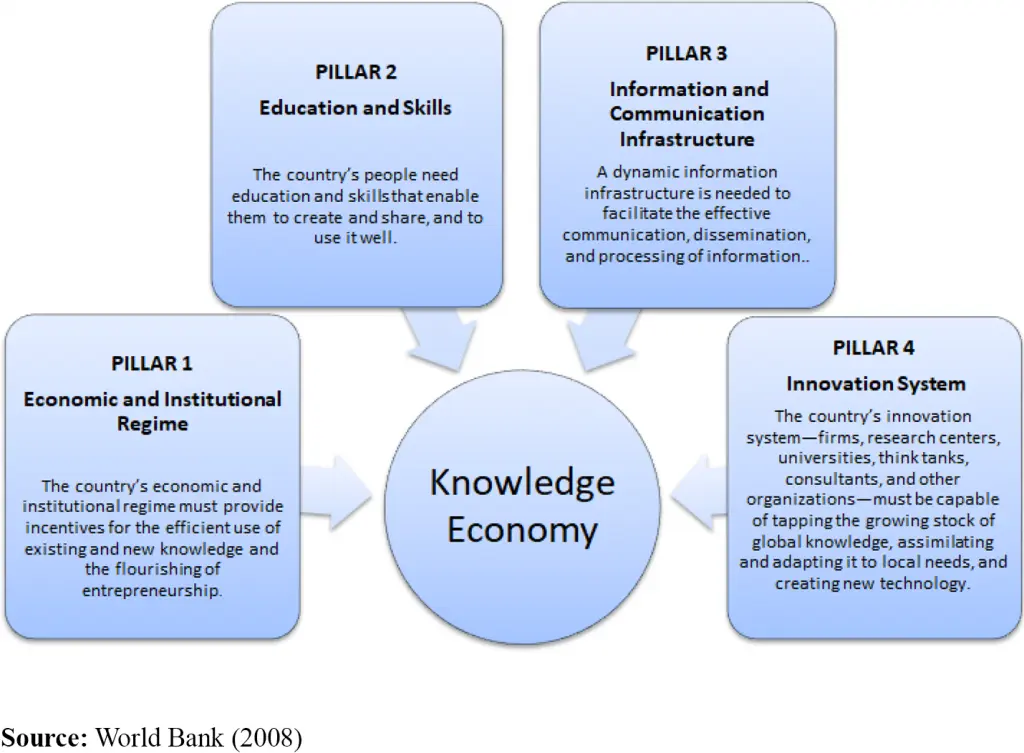We live in a world of rapid digital progress, an age of information. Consequently, economies have become more dynamic. From previously focusing on goods, they now focus on knowledge. This change from the traditional understanding of commodities is what a knowledge economy is about. Here the value is in expertise, innovation, and brainpower. Some common examples are consulting, branding, IT support, and research.

The knowledge economy (or the knowledge-based economy) is an economic system in which the production of goods and services is based principally on knowledge-intensive activities that contribute to advancement in technical and scientific innovation.
- Walter W. Powell & Kaisa Snellman.
To think of such economies as recent will be wrong. In fact, economics and education have always been central to each other. After all, one needs to possess some knowledge to produce and sell a commodity. During the stone-age, it was the knowledge of making fire that drove the economy. Later, it was agricultural know-how. Finally, now it is about brainpower. Hence, we can see that now there is less reliance on physical capabilities.
More specifically, the term got popular around the mid-1900s - 2000s. It was around this time that the world moved from post-industrial to the service sector. This transformation from an industrial economy to a knowledge economy is undoubtedly a highlight of modern times.
Relevance of knowledge economy in L&D
Learning and Development have become a core phenomenon for organizations. Companies now more than ever understand the worth of investing in the educational growth of their employees. This is why there is an ever-growing demand for innovation within L&D.
L&D programs are about employee training and knowledge building to help them advance in their careers. Thus, education becomes an investment for both the companies and employees. To illustrate this better, when employees learn new skills, their performance improves which positively impacts the organization's growth. Hence, they can capitalize better on the newly gained knowledge.
To further understand why companies require L&D within knowledge economies, take a look at the following points:
- To attract smart talent - Since the organizations desire to employ the best amongst the workforce, employee training makes for the best solution. Moreover, it is near impossible to find the perfect talent, however, it is much easier to train average employees into extraordinary ones.
- Knowledge development - A study shows that by the age of 35, 25% of the employees would have switched 5 jobs. During such uncertain tenure, it is important to lose talent and maintain employee retention. L&D makes the employee feel valued and gives them a secure growing space. Consequently, they wish to remain in their organizations for longer periods. Hence, knowledge is kept well within the companies.
Pillars of Knowledge Economy
According to the World Bank Institute, four core pillars make up this economy. Let's take a look at them in greater detail.

1. Institutional structures
These structures are important to provide necessary incentives for entrepreneurship. They can be government or non-governmental authorities that sponsor small business innovation through grants or professional support. For example, the US government supports small business innovation through several research initiatives. One such program - Small Business Innovation Research Program - provides financial grants of up to $1,000,000 for growth.
2. Skilled labor and good education
Education is central to knowledge-building. This particular aspect revolves around both formal and informal education. We see nowadays that a lot of professionals have taken to online courses for skill acquisition. One can easily and quickly learn transferable skills through short online courses. Without the necessary skills and education, one simply cannot contribute to the knowledge economy.
3. Innovation systems
Innovation systems are intricate systems of firms, research centers, universities, consultants, etc. These are actors - governmental or non-governmental - that contribute to innovation. Think of research organizations or think tanks that routinely come up with new trends in learning. Hence, these systems are vital to the advancement of this economy
4. Access to information and communication technology structures
These ICT structures are search engines such as Google and access to the internet. Having access to them is central to the development of knowledge in the modern world. It is also important that these structures are made available worldwide for global and interconnected spreading out of the economy. These structures facilitate effective and rapid communication and processing of information.
Stakeholders of the knowledge economy
So who can benefit from these new trends in the economy? Your answer is below:
Course creators
Hands down, course creators are having a breeze with these new trends. Creation of knowledge, sharing it, and selling it is the central aspect of the knowledge economy. Creatives now have a brilliant opportunity to turn their passions into knowledge sharing and make money from it. One such popular example is that of Dickie Bush and Nicolas Cole from the very successful online writing program Ship30for30.
Dickie and Nicolas started their company as a challenge. They gave them a deadline of a month to write online to improve their skills. Consequently, they found that other people followed suit and it opened a market opportunity for them. Eventually, ship 30for30 was born.
It will not be wrong to refer to this economy as a 'creator economy'. If you are a course creator, conditions are perfect for you to tap into your abilities and make the most of them.
Tech companies, consultancies, and agencies
Other stakeholders that can benefit immensely in this economy are tech companies and consultancy firms. Look at some of the famous consultancy firms and how they were able to capitalize on knowledge sharing to make millions of dollars. Mckinsey & Company is one such success story. It is a management consulting firm founded in 1926 by the University of Chicago Professor James O. Mckinsey, Its primary role is to advise organizations and governments on strategic management.
Another example is of edTech companies. Teachfloor is one such online learning platform that enables course creators and companies to develop and host their educational content. In a sense, Teachfloor acts as a sponsor of knowledge-sharing and consequently makes money along the process. Moreover, the platform also enables others to contribute to the process of knowledge sharing and capitalize on it.
How to benefit from the Knowledge economy?
Much has been said about what is the knowledge economy but how can one gain from it? Well, it is pretty simple. Begin by coming up with an original idea and find smart ways of sharing it. This is how you do it:
- Find your niche - Think about your passions and what you are good at. Compare the two and isolate the ones for which you have the most skills. That is your niche. Then ask yourself if this is a tradeable niche. Is there a market for it and a suitable audience? Once you have these points sorted you can begin working on cashing your niche.
- Develop an online course - Developing a course is not that simple. To ensure its success, try working your skills as a freelancer. Earn sufficient knowledge and experience that you can use for your course content. Moreover, join an online community. An online community can provide professional and personal help along the way of developing your course. Furthermore, it can also earn you a prospective audience as followers. Once you are certain of your knowledge, you can proceed with your online course.
- Build a knowledge economy brand - Finally, build a brand for yourself. Since people have access to knowledge-building systems now more than ever, the competition has also gone up. To highlight your work, make it seem original and unique which is why you will have to work on developing a unique brand identity for your business as well.
Conclusions: The future of the knowledge economy
There is no doubt that the knowledge economy offers multiple benefits to communities. However, due to the uneven distribution of resources and access to information, it is found that some 70% of patenting and production in this new economy happens in the developed world. This disparity puts the entire world at a disadvantage as not everyone can contribute and hence diversify the economy.
Interestingly, the thing about the knowledge economy is that with the help of the internet world can be more evenly connected. Consequently, entrepreneurs from the developing world can also capitalize on their skills. As mentioned above, accessibility is internal to the growth of the knowledge economy.
%201.svg)


.png)






%201.svg)

